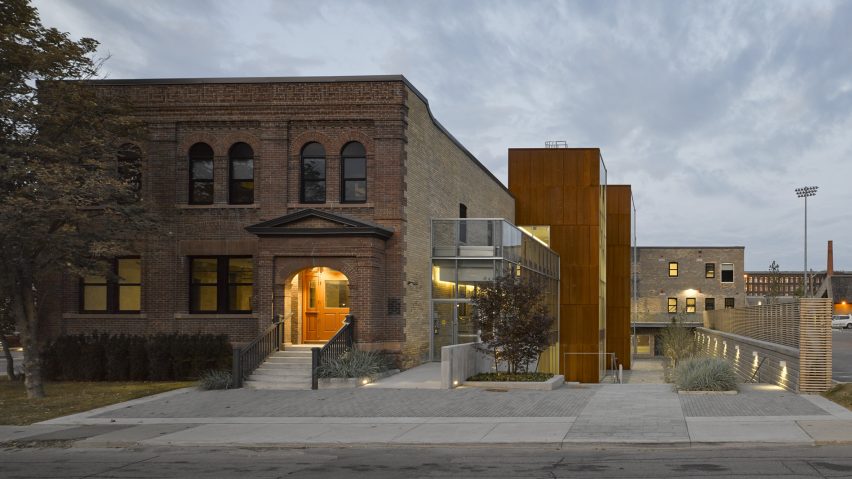Canadian firm Quadrangle Architects has transformed a 19th-century brick building once used to store wine into a workspace for designers, artists and tech companies.
Named 60 Atlantic Avenue, the 43,000-square-foot building (3,995 square metres) is located in Toronto's Liberty Village neighbourhood, a former industrial area now occupied by young professionals and creative-sector businesses.
L-shaped in plan, the brick building was constructed in 1898 as a wine warehouse, but later became a storage facility for a department store. It was converted into artist studios in the 1990s.
"After a century of renovations, the exterior was in rough shape, the interior was congested and convoluted and the building seemed slated for demolition," said Quadrangle Architects, a Toronto-based firm established in 1986.
The project involved fully refurbishing the building, and transforming it into an office and retail space.
The team started by stripping away elements that had been added over the years, returning the building to its original state.
The team then added a circulation volume sheathed in Corten steel and glass, which aims to "honour the industrial vernacular of the area". Constructed on the side of the building, the new volume improves flow and unifies the varying floors.
The team also created a new outdoor, sunken courtyard that is accessed from an existing basement. The lower level is now a bright and open space that can be occupied by a restaurant and beer garden.
New construction is denoted by grey brick, which contrasts with the existing buff brick.
"The updated design and materials visually illustrate the building's history," the studio said.
Studio and office spaces occupy the upper levels, framed by original brick walls and heavy timber beams. High ceilings, open floors and generous windows make the workspaces "ideally suited to tenants from the creative and technology industries".
Artistic elements were incorporated throughout the project.
The team painted a supersize "60" – the building's address – on the south facade to draw attention to the facility and increase brand presence. Inside, wall panels feature a historic map of the neighbourhood.
The architects said the project demonstrates the value of adaptively reusing old buildings.
"The true meaning and value of heritage is not the restoration of existing bricks and mortar, but a repositioning which gives new life, new relevance and usefulness for the future," they said.
Photography is by Ben Rahn.
Project credits:
Client: Hullmark Developments Ltd
Tenants to Date: INVIVO Communications, Big Rock Brewery, Regus
Architecture and Interior Design Team: Quadrangle Architects Limited
Base Building: Richard Witt, Brian Curtner, Kevin Offin, Court Sin, Danny Tseng, Derek Towns
Interiors: Caroline Robbie, Dyonne Fashina, Julie Mroczkowski, Kenzie Thompson
Mechanical & Electrical Engineers: Integral Group
Structural Engineers: Read Jones Christoffersen
Construction Management: First Gulf
Landscape Architect: Vertechs Design Inc.
Heritage Consultant: Philip Goldsmith Architect
Interior Corten Wall cladding: Praxy Cladding Corp
Wayfinding Corten panels: Pengelly Iron Works
Interior Environmental Graphics: Goad's Fire Atlas graphic from BGM Imaging
Exterior Wall Graphic: "60" by Pascal Paquette

